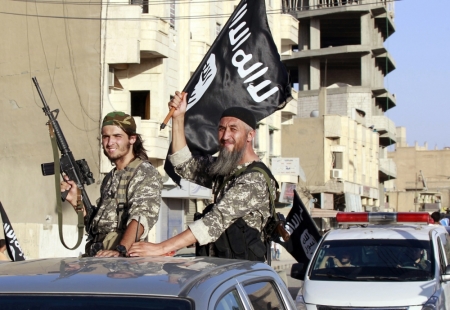ISIS Holds Last Remaining Christian Families Under House Arrest So They Can't Escape Raqqa

The Islamic State is reportedly preventing remaining Christian families in the group's Syrian stronghold of Raqqa from leaving the city, as fears grow that the terror group is planning to kill the remaining Christians in the town.
The activist organization Raqqa is Being Slaughtered Silently (RIBSS), a media group that reports on life in Raqqa using sources within the city, tweeted Tuesday that IS (also known as ISIS or ISIL) has issued a new order to prohibit Christians from leaving the city "under any condition."
#ISIS Issued a new decision to Prevent any Christians or Armenians people who Remain in #Raqqa to leave the city under any condition #Syria
— ????? ???? ???? (@Raqqa_SL) March 29, 2016
In a follow-up tweet posted Thursday, the group stated that it has counted as many as 43 Christian families that still remain in the town, with each family consisting of about two to three people.
According to a Google translation of an article posted to the RIBSS website Thursday, Christians in the town are not only prevented from leaving but are also being held under house arrest.
When IS took over its strongholds in Iraq and Syria, it was widely reported that the group gave Christians and other religious minorities the option to convert to Islam, pay a religious tax or flee the city.
"ISIS looks at Christians as infidels loyal to the West more than their loyalty to their homeland which they live," an analysis posted to RIBSS' website last November states. "And on this basis began to impose restrictions and additional conditions on this sect to contribute to blur the identity and history of long-standing and deep-rooted within the Syrian society, and forcing the rest of the sons and elderly to leave the city unwillingly not voluntarily."
As the Daily Mail also reports that IS is preventing Christians from leaving Raqqa, fears are growing that the group might be plotting to kill the remaining Christians. However, that claim is unconfirmed.
According to RIBSS, Christians that remain in the town did not flee because they did not have the means financially or physically to do so.
Christians who live in IS-held territory are forced to pay a religious tax (jizya) and are prohibited from conducting their religious rituals, building churches or wearing crosses in public.
"There are a couple of families left in Raqqa. I was surprised," Nuri Kino, founder and president of an organization that advocates for the protection of religious minorities in the Middle East called A Demand For Action, told Newsweek in an article published Wednesday.
"I spoke to a Syriac man who only left Raqqa about six weeks ago," Kino continued. "He turned up at an association in Germany. It turns out that some families actually are in Raqqa, paying jizya and are being protected by their former neighbors, Sunni Muslim neighbors, as long as they follow the Shariah laws.
Kino added that Christians under IS rule must carry a document with them that explains that "they are protected by the Shariah, by the court, that they have been to the court, that they are paying jizya and that they also have some kind of sponsor or protector."





















